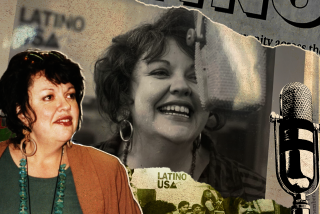U.S. Reported Ready to Begin Cuba Broadcasts
- Share via
WASHINGTON — Radio Marti, the Reagan Administration’s long-postponed project to broadcast news to Cuba, will go on the air Monday morning, Florida Sens. Paula Hawkins and Lawton Chiles said Saturday.
Hawkins, a Republican, and Chiles, a Democrat, said they received word from the White House earlier in the day that the station will begin beaming programming at 5:30 a.m. Monday, the island’s independence day. It will broadcast on a seven-day-a-week, 14-hour-a-day schedule, they said.
“For over 25 years, Cuba has had to listen to the lies of Fidel Castro,” Chiles said in a statement released by his office. “Radio Marti will shed light, and the Cuban people will never be in the dark again.”
Hawkins also issued a statement, saying: “I’m pleased that the voice of freedom and truth will at last be heard in Cuba. It is a lot less expensive, and often more effective, to fight communism with the truth instead of bullets.”
Administration spokesmen could not be reached to confirm the senators’ statements, but sources already had said programming could start as early as Monday despite concerns that Havana may try to jam the signal, whose frequency is 1180 AM.
Rogene Waite, a Voice of America spokesman, confirmed that officials are concerned about the possibility that President Fidel Castro would try to jam broadcasts by the station, which is named for 19th-Century Cuban patriot Jose Marti. There is also a fear that Castro might retaliate by interfering with the signals of U.S. commercial stations.
“Everyone takes the threat fairly seriously,” she said.
The station will be operated by the Voice of America, which is required to maintain balance in its news reports. The White House had wanted it to be a separate entity, similar to Radio Free Europe, beamed at Eastern Europe, and Radio Liberty, aimed at the Soviet Union.
Waite said its programming would resemble that of Radio Free Europe and Radio Liberty. Typical topics for in-depth news programs, she said, might include Cuban troops in Angola and “lack of opportunity” in Cuba today.
More to Read
Sign up for Essential California
The most important California stories and recommendations in your inbox every morning.
You may occasionally receive promotional content from the Los Angeles Times.












